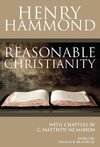C. Matthew McMahon
Christian Preacher
[video=vimeo;134865073]https://vimeo.com/134865073[/video]
"I believe the Bible because...I believe the Bible." Is that what you tell a non-believer?
"Reasonable Christianity," by Henry Hammond (1605-1660)
Henry Hammond (1605-1660) was one of the most popular English divines in his day. He desired to be a practical Christian preacher and faithful witness of the Gospel of Christ.
The Christian must have an intellectual handle on everything that comes up against the Christian faith in order to glorify Jesus Christ as a faithful witness to the truth. The Christian must be able, as St. Peter exhorts, to give an answer for the faith which lies within him. That means he must be aware of arguments against the Christian faith (to some extent), and have some knowledge on everything that comes against Christian truth. So, how ready are you?
The goal of this apologetical work by Henry Hammond is very simple. It was written to show the rationality of the Christian religion against the accusations that Christianity is irrational. Atheists in every age believe that Christianity is irrational, and that Christians just believe things on blind faith. To the atheist, blind faith believes in fairy tales for the sake of believing in fairy tales. Here is where Hammond’s arguments are astoundingly helpful, and will allow the Christian to arm themselves with some of the best Biblical material in print to overthrow atheism.
eBook Pack at the Puritan Shop (mobi, ePub and PDF).
Kindle Version
Google Play Version
Printed Book at Puritan Publications

"I believe the Bible because...I believe the Bible." Is that what you tell a non-believer?
"Reasonable Christianity," by Henry Hammond (1605-1660)
Henry Hammond (1605-1660) was one of the most popular English divines in his day. He desired to be a practical Christian preacher and faithful witness of the Gospel of Christ.
The Christian must have an intellectual handle on everything that comes up against the Christian faith in order to glorify Jesus Christ as a faithful witness to the truth. The Christian must be able, as St. Peter exhorts, to give an answer for the faith which lies within him. That means he must be aware of arguments against the Christian faith (to some extent), and have some knowledge on everything that comes against Christian truth. So, how ready are you?
The goal of this apologetical work by Henry Hammond is very simple. It was written to show the rationality of the Christian religion against the accusations that Christianity is irrational. Atheists in every age believe that Christianity is irrational, and that Christians just believe things on blind faith. To the atheist, blind faith believes in fairy tales for the sake of believing in fairy tales. Here is where Hammond’s arguments are astoundingly helpful, and will allow the Christian to arm themselves with some of the best Biblical material in print to overthrow atheism.
eBook Pack at the Puritan Shop (mobi, ePub and PDF).
Kindle Version
Google Play Version
Printed Book at Puritan Publications

Last edited:
